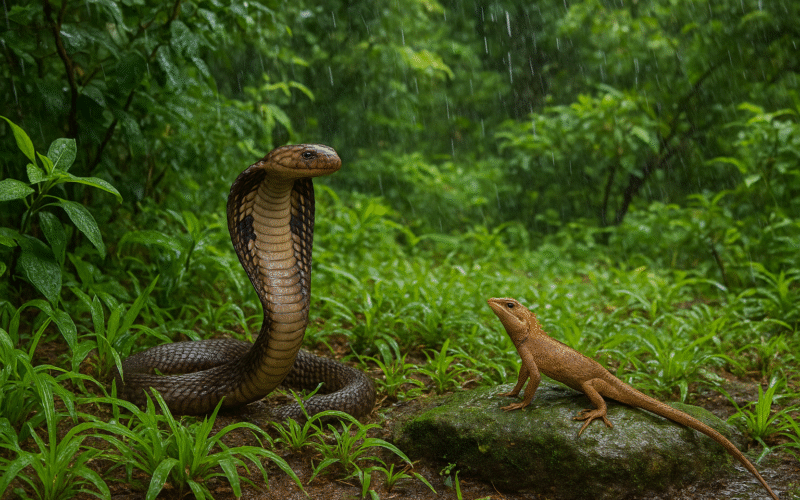The monsoon season brings refreshing rains, lush greenery, and cooler weather—but it also increases the chances of reptile encounters. From snakes and lizards to frogs, reptiles often find their way into gardens during this time. Luckily, with the right precautions, you can keep reptiles out of your garden during the monsoon safely and naturally.
Table of Contents
Why Reptiles Appear More in the Monsoon
Eco-Friendly Ways to Keep Reptiles Out of Your Garden
Clear Garden Clutter
Seal Entry Points
Keep the Area Dry
Use Natural Deterrents
Manage Lighting at Night
What to Do If a Reptile Enters Your Home
Safe Wildlife Rescue Contacts in India
Final Thoughts
Why Reptiles Appear More in the Monsoon
Reptiles are cold-blooded and rely on external conditions for survival. The monsoon season creates the perfect mix of moisture, shelter, and food, making gardens an ideal spot for them.
Flooded shelters: Burrows, cracks, and underground homes flood during rains, forcing reptiles to move into open spaces like gardens.
Increased prey: Frogs, insects, and rodents multiply in wet weather, attracting reptiles.
Breeding season: For many species, monsoon triggers mating activity, leading to more sightings.
Without preventive steps, your garden can quickly become a resting ground for reptiles.
Eco-Friendly Ways to Keep Reptiles Out of Your Garden
The good news? You don’t need harmful chemicals or expensive traps. Here are 7 eco-friendly ways to keep reptiles away from your garden:
1. Clear Garden Clutter
Remove leaf piles, unused pots, stacked bricks, or wood.
Regularly trim overgrown shrubs and long grass.
Keep compost heaps enclosed and managed properly.
2. Seal Entry Points
Repair cracks in boundary walls and fences.
Cover open drains and water outlets.
Install fine mesh or screens on basement and ventilator openings.
3. Keep the Area Dry
Empty water from trays, tyres, or buckets.
Fix leaking outdoor taps and pipes.
Ensure proper drainage to prevent stagnant water.
4. Use Natural Deterrents
Spray garlic water or clove oil around boundaries.
Place neem leaves or sprinkle tobacco dust in corners.
Use naphthalene balls in storage areas (away from pets and children).
5. Manage Lighting at Night
Bright garden lights attract insects, which attract reptiles.
Switch to yellow LED bulbs or install motion-sensor lights.
Reduce unnecessary night-time lighting in the garden.
Read Also: 15-best-money-making-agriculture-business-ideas-in-india
What to Do If a Reptile Enters Your Home
Even with precautions, reptiles may sometimes enter your home. If this happens:
Stay calm and do not try to trap or kill the reptile.
Maintain a safe distance and keep children/pets away.
Contact professional rescuers for safe removal.
Many snakes in India are non-venomous and prefer to escape rather than attack, but it’s always best to seek expert help.
Safe Wildlife Rescue Contacts in India
If you need assistance, here are trusted wildlife rescue organisations:
Friends of Snakes Society (Hyderabad) – +91 83742 44172
Contact your local forest department or municipal corporation, as many maintain official lists of wildlife rescuers.
Final Thoughts
The monsoon season is a time of natural abundance, but it also increases reptile activity. By following these eco-friendly tips to keep reptiles out of your garden during the monsoon, you can enjoy your greenery without worry.
Simple steps like clearing clutter, sealing entry points, and using natural repellents make a big difference. And remember—reptiles are an important part of the ecosystem, so handling encounters safely and responsibly helps both you and nature.
Final Tips at a Glance
Maintain cleanliness – Regularly clear clutter, trim plants, and dispose of waste properly.
Block entry points – Seal cracks, cover drains, and use mesh where needed.
Avoid waterlogging – Ensure good drainage and remove stagnant water.
Rely on natural repellents – Garlic, clove oil, neem, and tobacco dust are effective eco-friendly deterrents.
Adjust garden lighting – Use yellow LEDs or motion-sensor lights to avoid attracting insects (and reptiles).
Stay calm indoors – If a reptile enters your home, don’t panic—keep a safe distance.
Call professionals – Contact certified wildlife rescuers or local forest departments instead of handling reptiles yourself.
Pro Tip: Reptiles play an important role in controlling pests naturally. By discouraging them safely instead of harming them, you protect your garden, your family, and the ecosystem.

